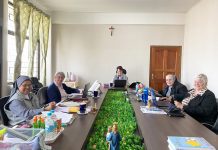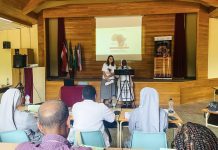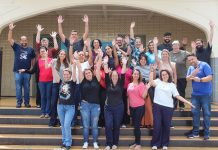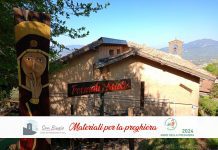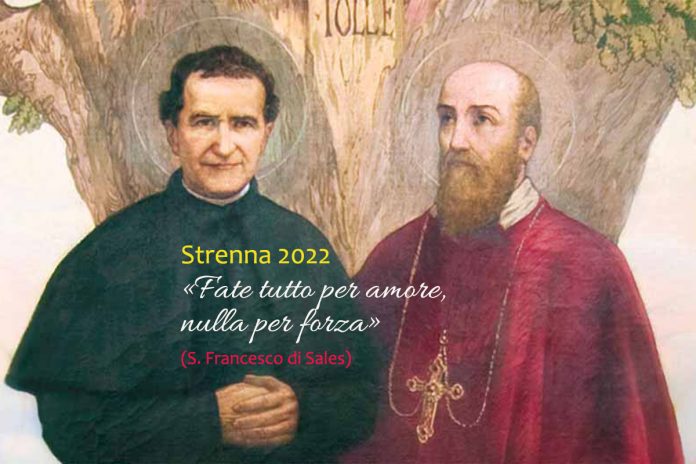Rome (Italy). On 23 July 2021, the Rector Major of the Salesians of Don Bosco, Fr. Ángel Fernández Artime, announced the theme of the Strenna for the year 2022, “Do everything for love, nothing by force” (St. Francis de Sales).
The theme is linked to the Spirituality of Saint Francis de Sales – in 2022 is the fourth centenary of the anniversary of his death – “source of the Salesian spirit of Don Bosco, from which our Father and Founder drank and which he contemplated at every moment and inspirer of the incipient Salesian Congregation for the educational and evangelizing style: ‘We will call ourselves Salesians’”.
Don Bosco declares: “[The oratory] began to be called St. Francis de Sales […] because [for] the part of that ministry of ours, demanding great calm and meekness, we placed ourselves under the protection of this saint, so that he could obtain us from God the grace to be able to imitate him in his extraordinary meekness and in winning souls.”
Strenna 2022 will provide an opportunity for the Groups of the Salesian Family, to “recognize and find ourselves in the spirituality of Saint Francis de Sales” and appreciate the characteristics of the Salesian spirit of Don Bosco, as well as the values of Salesian youth spirituality, “Without a doubt we will see ourselves reflected in them and we will feel called to be today ‘more Salesians’ in our Salesian Family”.
Being completely of God, fully living his presence in the world
Fr. Ángel Fernández Artime defines this proposal as “the most ‘revolutionary’ of St. Francis de Sales”, an appeal to the sanctification of daily life that Pope Benedict XVI, in the General Audience on St. Francis de Sales on 2 March 2011, expressed as the an invitation to Christians to “be completely of God, living fully their presence in the world and the tasks of their own state”.
Centrality of the heart
The in-depth reading of the Song of Songs during his formation in Paris, leads Francis de Sales to conversion and to the vision of a God characterized by profound humanity. The heart, chosen as a symbol for the Order of the Visitation which he founded, is the most eloquent sign of his entire human and spiritual heritage: “The humanism of Francis, his desire and ability to enter into dialogue with everyone, the great value he gives to friendship, so important for personal accompaniment in the way Don Bosco will interpret it, everything is built on the solid foundations of the heart, as Francis lived it”.
Between providence and loving-kindness
From the way of feeling the heart of God and opening the heart to the others derive the sense of Providence and the loving-kindness of St. Francis de Sales, which Don Bosco reinterprets in his educational system.
The expression ‘holy indifference’ that he uses in his writings is a concrete manifestation of the sense of Providence, “I trust without reserve in the heart of God, and this disposes me to embrace any detail that the sequence of events and circumstances presents before me each day. I have ‘nothing to ask for and nothing to refuse’ with respect to what I know to be in the hands of God in any case”.
Kindness is “sweetness of heart, before behavior, towards the neighbor, even when unfriendly and very unpleasant as a character; it is a reflection of the same trust, this time in regard to the human heart, always open to the action of God and always destined for the fullness of life”.
The internship of the mission in Chiablese and Don Bosco’s Da mihi animas
The mission, in particular the difficult experience of evangelization in Chiablese between 1593 and 1596, gives substance to the life of Saint Francis de Sales. Those years can be read as a Eucharistic pedagogy, “The visible Eucharist, celebrated with great participation of the people, carried in procession after years of emptiness, is the culmination of a long desert, where it is He who lives in the Eucharist and makes His presence known secretly among the previously hostile people, and whom He approaches and makes friends one by one. ”
In his missionary example and in Eucharistic spirituality, the Rector Major recognizes the work of many Salesian presences in reaching those to whom they are sent “with patience and perseverance, without renouncing the explicit proclamation, but knowing how to wait for God’s long time”.
“All this speaks to us of Don Bosco’s educational and evangelizing passion who, in the presence of the Lord in the Eucharist and in the strong presence of Mary in the life of the Oratory among his children, found the daily strength to carry out the Da mihi animas, cetera tolle”.
But how to communicate?
Don Bosco is a disciple of Francis de Sales, patron saint of journalists and master of communication, whom he follows with zeal by promoting and encouraging reflection, culture, humanism in its most beautiful expressions and with the means of the time, “is for us a message of maximum relevance and a real challenge in today’s world where communication is at the center of reality”.
It is a beautiful proposal for the Church today and for Don Bosco’s Salesian Family to cultivate the art of accompanying the journey of faith, especially of many boys, girls, and young people of the world who do not know God, but at the same time, hunger and thirst for Him, often without knowing it” and it is very ‘Salesian’ to feel that they need ‘a friend of the soul’, in which to find advice, help, guidance, and friendship”.
The Rector Major of the Salesians of Don Bosco concludes by recalling the words of Benedict XVI who invites us to follow the testimony of Christian humanism of Saint Francis de Sales in a ‘spirit of freedom’, “with his family style, with parables that sometimes have the wings of poetry, he remembers that humans carry the nostalgia for God inscribed in their depths and that only in Him do they find true joy and its fullest realization”.
Complete text: www.sdb.org



